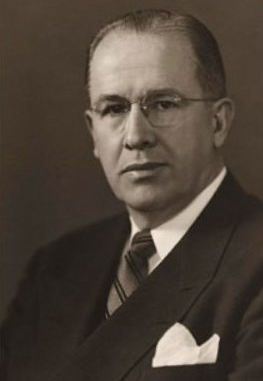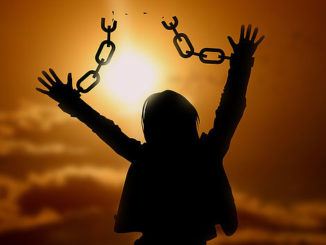
Editorial Note: Many years ago I stumbled upon this address which is found on the Foundation for Economic Education (FEE) web site. It is given by former Secretary of Agriculture Ezra Taft Benson. It has had a significant impact upon my life and has also been a driving force behind The Minuteman. It is a longer read than what readers of The Minuteman are used to, but I highly recommend it. If you would prefer to listen to the audio version, I will post the link to it at the bottom of the address.
The Proper Role of Government
Ezra Taft Benson
November 1, 1976
I am humbly grateful to God for the blessings we all enjoy as citizens of these great United States of America. I am grateful for our Founding Fathers who were raised up with the courage to give their lives, with the unselfishness to give their fortunes, and the vision to pledge their sacred honor in order to establish a new kind of government of their own choosing where men might be free. I am additionally grateful that these Founding Fathers had the faith and humility to accept the divine inspiration so necessary in setting forth the Constitution as the foundation for their new Republic.
Men are often asked to express an opinion on a myriad of government proposals and projects. All too often, answers seem to be based not upon solid principles, but upon the popularity of the specific government program in question. Seldom are men willing to oppose a popular program—especially if they seek public office.
Such an approach to vital political questions of the day can only lead to public confusion and legislative chaos. Decisions of this nature should be based upon and measured against certain basic principles regarding the proper role of government. If principles are correct, then they can be applied to any specific proposal with confidence. Unlike the political opportunist, the true statesman values principle above popularity and works to create popularity for those political principles which are wise and just. How much this country needs men with a mandate higher than the ballot box!
It is generally agreed that the most important single function of government is to secure the rights and freedoms of individual citizens. But what are those rights? And what is their source? Until these questions are answered, there is little likelihood that we can correctly determine how government can best secure them.
Origin of Rights
Let us first consider the origin of those freedoms we have come to know as human rights. Rights are either God-given as part of the divine plan, or they are granted by government as part of the political plan. Reason, necessity, tradition, and religious convictions all lead me to accept the divine origin of these rights. If we accept the premise that human rights are granted by government, then we must be willing to accept the corollary that they can be denied by government.
I support the doctrine of separation of church and state as traditionally interpreted to prohibit the establishment of an official national religion. But this does not mean that we should divorce government from any formal recognition of God. To do so strikes a potentially fatal blow at the concept of the divine origin of our rights and unlocks the door for an easy entry of future tyranny. If Americans should ever come to believe that their rights and freedoms are instituted among men by politicians and bureaucrats, then they will no longer carry the proud inheritance of their forefathers, but will grovel before their masters seeking favors and dispensations, a throwback to the feudal system of the Dark Ages.
Since God created man with certain inalienable rights and man, in turn, created government to help secure and safeguard those rights, it follows that man is superior to the creature which he created. Man is superior to government and should remain master over it, not the other way around. Even the nonbeliever can appreciate the logic of this relationship.
A government is nothing more or less than a relatively small group of citizens who have been hired, in a sense, by the rest of us to perform certain functions and discharge certain responsibilities which have been authorized. The government itself has no innate power or privilege to do anything. Its only source of authority and power is from the people who created it.
Keep in mind that the people who have created their government can give to that government only such powers as they themselves have. They cannot give that which they do not possess.
In a primitive state, there is no doubt that each man would be justified in using force, if necessary, to defend himself against physical harm, against theft of the fruits of his labor, and against enslavement by another.
Indeed, the early pioneers found that a great deal of their time and energy was being spent defending themselves, their property, and their liberty. For man to prosper, he cannot afford to spend his time constantly guarding his family, his fields, and his property against attack and theft. When he joins together with his neighbors and hires a sheriff, government is born. The individual citizens delegate to the sheriff their unquestionable right to protect themselves. The sheriff now does for them only that which they had a right to do for themselves—nothing more.
From Whence This Claim?
But suppose pioneer "A" wants another horse for his wagon. He doesn’t have the money to buy one, but since pioneer "B" has an extra horse, he decides that he is entitled to share in his neighbor’s good fortune. Is he entitled to take his neighbor’s horse? Obviously not! If his neighbor wishes to give it or lend it, that is another question. But so long as pioneer "B" wishes to keep his property, pioneer "A" has no just claim to it.
If "A" has no proper power to take "B’s" property, can he delegate any such power to the sheriff? No. Even if everyone in the community desires that "B" give his extra horse to "A," they have no right individually or collectively to force him to do it. They cannot delegate a power they themselves do not have. The proper function of government is limited only to those spheres of activity within which the individual citizen has the right to act. By deriving its just powers from the governed, government becomes primarily a mechanism for defense against bodily harm, theft, and involuntary servitude. It cannot claim the power to redistribute the wealth or force reluctant citizens to perform acts of charity against their will. Government is created by man. No man can delegate a power that he does not possess. The creature cannot exceed the creator. In general terms, therefore, the proper role of government includes such defensive activities as maintaining national military and local police forces for protection against loss of life, loss of property, and loss of liberty at the hands of either foreign despots or domestic criminals. It also includes those powers necessarily incidental to the protective function.
We should recognize that government is no plaything. It is an instrument of force; and unless our conscience is clear that we would not hesitate to put a man to death, put him in jail, or forcibly deprive him of his property for failing to obey a given law, we should oppose that law.
The Constitution of the United States, an inspired document, is a solemn agreement between the citizens of this nation that every officer of government is under a sacred duty to obey.
Local Control Preferable
The Constitution provides that the great bulk of the legitimate activities of government are to be carried out at the state or local level. This is the only way in which the principle of self-government can be made effective. The smallest or lowest level that can possibly undertake the task is the one that should do so. The smaller the governmental unit and the closer it is to the people, the easier it is to guide it, to correct it, to keep it solvent, and to keep our freedom. Remember that the people of the states of this Republic created the federal government. The federal government did not create the states.
A category of government activity that not only requires the closest scrutiny but that also poses a grave danger to our continued freedom is the activity not within the proper sphere of government. No one has the authority to grant such powers as welfare programs, schemes for redistributing the wealth, and activities that coerce people into acting in accordance with a prescribed code of social planning. There is one simple test. Do I as an individual have a right to use force upon my neighbor to accomplish this goal? If I do, then I may delegate that power to my government to exercise it in my behalf. If I do not have that right, I cannot delegate it.
If we permit government to manufacture its own authority, and to create self-proclaimed powers not delegated to it by the people, then the creature exceeds the creator and becomes master. Who is to say, "this far, but no farther?" What clear principle will stay the hand of government from reaching farther and farther into our daily lives? Grover Cleveland said that "though the people support the government, the government should not support the people:"
An Instrument of Plunder
Once government steps over this clear line between the protective or negative role into the aggressive role of redistributing the wealth through taxation and providing so-called "benefits" for some of its citizens, it becomes a means for legalized plunder. It becomes a lever of unlimited power that is the sought-after prize of unscrupulous individuals and pressure groups, each seeking to control the machine to fatten his own pockets or to benefit his favorite charity, all with the other fellow’s money, of course. Each class or special interest group competes with the others to throw the lever of governmental power in its favor, or at least to immunize itself against the effects of a previous thrust. Labor gets a minimum wage. Agriculture gets a price support. Some consumers demand price controls. In the end, no one is much further ahead, and everyone suffers the burdens of a gigantic bureaucracy and a loss of personal freedom. With each group out to get its share of the spoils, such governments historically have mushroomed into total welfare states. Once the process begins, once the principles of the protective function of government give way to the aggressive or redistributive function, then forces are set in motion that drive the nation toward totalitarianism.
It Can Happen Here
You say, "It can’t happen here." I have just returned from Great Britain, that nation which has provided the free world with a tradition of freedom and democratic rights, stemming from the Magna Carta and coming down through other important historical documents and statements by famous Englishmen. Yet England today is losing her freedom and democracy. She has become a giant welfare state. Today government spending in Great Britain amounts to sixty per cent of her national income. This has led the renowned University of Chicago economist, Dr. Milton Friedman, to forecast: "I fear very much that within the next five years the odds are at least fifty-fifty that British freedom and democracy as we have seen it will be destroyed?’ Recognizing the past record of the British people for stamina and courage, I am hopeful—even confident—that they will disprove this prediction. I hope and pray they will meet the serious challenges facing them.
The lesson of New York City should tell us that this same thing can happen here—to us—now. New York City is no longer governed by its elected officials. It is governed by a committee of overseers appointed by the State of New York. New York City has partially lost its freedom! When will we learn the lesson that fiscal irresponsibility leads to a loss of self-government?
A recent study by the Ford Motor Company economists showed that there are more people being supported by taxes in the United States (80,655,000) than there are people working in the private sector of the economy to pay the taxes (71,650,000).
Among those living on your tax dollars, according to the Ford study, were those on welfare and retirement programs, government employees, military personnel on active duty, and the disabled and unemployed. "A new American majority is being created," the study states, "who are exploiting the fact for their own political and professional purposes:’ Such was a major factor in the fall of Rome.
To pay for this and other beneficiaries of your tax dollar, almost one-third of the average income goes for taxes for the operation of government at one level or another. Put another way, you now work from January 1 to April 28 to pay for your federal, state, and local taxes.
Downgrading the Individual
According to Marxist doctrine, a human being is primarily an economic creature. His material well-being is all-important; his privacy and his freedom are secondary. The Soviet constitution reflects this philosophy in its emphasis on security; food, clothing, housing, medical care—the same things that might be considered in a jail. The basic concept is that the government has full responsibility for the welfare of the people and, in order to discharge that responsibility, must assume control of all their activities. It is significant that in actuality the Russian people have few of the rights supposedly "guaranteed" to them in their constitution, while the American people have them in abundance even though they are not guaranteed. The reason is that material gain and economic prosperity and security simply cannot be guaranteed by any government. They are the result and reward of hard work and industrious production. Unless the people bake one loaf of bread for each citizen, the government cannot guarantee that each will have one loaf to eat. Constitutions can be written, laws can be passed, and imperial decrees can be issued, but unless the bread is produced, it can never be distributed.
Why America Has Prospered
Why then do Americans bake more bread, manufacture more shoes, and assemble more TV sets than Russians do? They do so precisely because our government does not guarantee these things. If it did, there would be so many accompanying taxes, controls, regulations, and political manipulations that the productive genius that is America’s would soon be reduced to the floundering level of waste and inefficiency now found behind the Iron Curtain.
God has prospered this land! Though the United States has only about six per cent of the world population and seven per cent of the land area, our gross national product is about forty per cent of the world total. The principles behind this prosperity can be reduced to a rather simple formula:
1. Economic security for all is impossible without widespread abundance.
2. Abundance is impossible without industrious and efficient production.
3. Such production is impossible without energetic, willing, and eager labor.
4. This is not possible without incentive.
5. Of all forms of incentive—the freedom to attain a reward for one’s labors is the most sustaining for most people. Sometimes called the profit motive, it is simply the right to plan and to earn and to enjoy the fruits of your labor.
6. This profit motive diminishes as government controls, regulations, and taxes increase to deny the fruits of success to those who produce.
7. Therefore, any attempt through government intervention to redistribute the material rewards of labor can only result in the eventual destruction of the productive base of society, without which real abundance and security for more than the ruling elite is quite impossible.
A Heartless Approach
This may sound heartless and insensitive to the needs of those less fortunate individuals who are found in any society, no matter how affluent. "What about the lame, the sick, and the destitute?" is an often-voiced question. Most other countries have attempted to use the power of government to meet this need. Yet in every case, the improvement has been marginal at best and has, in the long run, created more misery, more poverty, and certainly less freedom than when government first stepped in.
As Henry Grady Weaver wrote: "Most of the major ills of the world have been caused by well-meaning people who ignored the principle of individual freedom, except as applied to themselves, and who were obsessed with fanatical zeal to improve the lot of mankind-in-the-mass through some pet formula of their own … The harm done by ordinary criminals, murderers, gangsters, and thieves is negligible in comparison with the agony inflicted upon human beings by the professional ‘do-gooders,’ who attempt to set themselves up as gods on earth and who would ruthlessly force their views on all others—with the abiding assurance that the end justifies the means." (The Mainspring of Human Progress.)
America was built on the principles of self-reliance, the profit motive, individual action, and voluntary charity. It was built by those who believed that the surest helping hand was at the end of their own sleeves. These forefathers of ours shared one thing in common—an unshakable faith in God and a faith in themselves.
It was heartening for me to see recently a testimony of the principles of faith in God and individual initiative in action. As you know, the eastern sector of Idaho was devastated by the Teton Dam flood. Immediately, government relief agencies were dispatched to the area. Government officials, veterans to the scenes of national disasters, were amazed at the reactions of these people to this seeming tragedy. Though victims of property loss, they are not victims of despair, despondency, and defeat. They collectively met in their Church meetings and thanked God for their lives, then they organized themselves and rolled up their sleeves and went to work. Even though welfare assistance and government food stamps were made available, these victims, by and large, chose the route of self-reliance. Because of this, they will emerge from this catastrophe stronger and more faithful.
I have great faith in America and its people. This is a choice land. If we live and work so as to enjoy the approval of a Divine Providence, we will endure as a nation. Without God’s help, we cannot long endure.
Today we face a crisis situation in our beloved Republic. There is first of all a spiritual crisis among our people. In our quest for material things, we have forgotten God. There is a crisis for competent, honest, and moral leadership in government at all levels. There is an economic and political crisis, where our basic freedoms stand in jeopardy because of a departure from fundamental principles. We must return to these basic principles if our free Republic is to survive.
Yes, in the words of Thomas Paine, "These are the times that try men’s souls. The summer soldier and the sunshine patriot will in this crisis, shrink from the service of his country, but he that stands it now, deserves the love and thanks of man and woman:’ That was said on December 23, 1776. Now, 200 years later, Paine’s words are even more apropos to our situation.
The days ahead are sobering and challenging and will require the faith, prayers, loyalty, courage, and moral integrity of every American citizen.
Sources:
1. Audio version can be found here:
http://www.properroleofgovernment.com/
2. https://fee.org/articles/the-proper-role-of-government/





